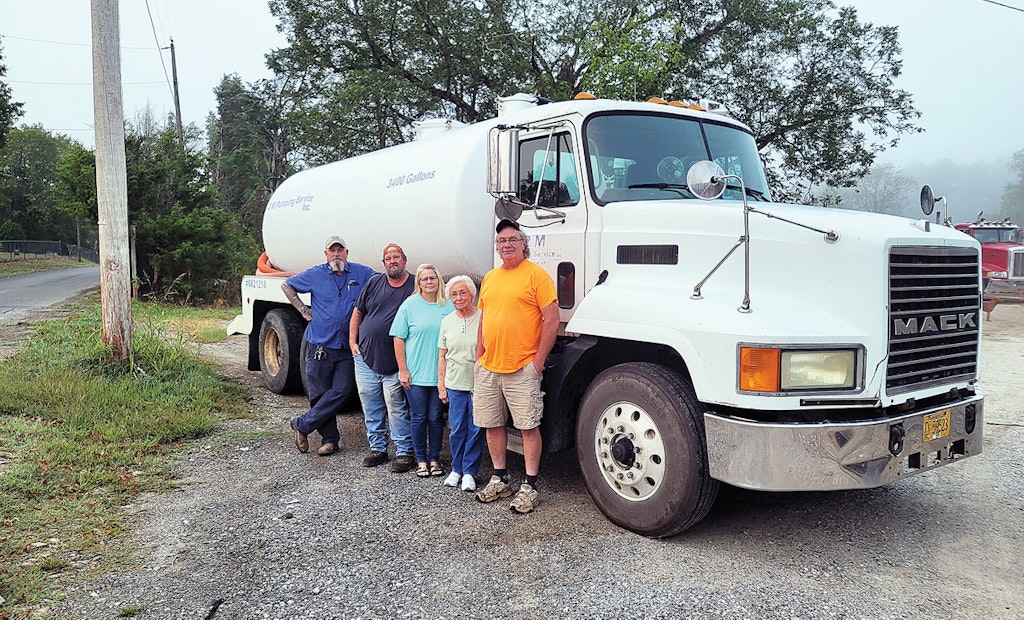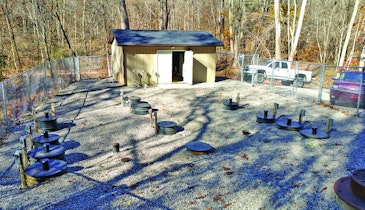Name and title or job description: Darius E. Melton, president
Business name and location: 2M Pumping Service, Hot Springs, Arkansas
Services we offer: Primarily septic pumping. We do some inspections but it’s limited. We don’t have the equipment to chase the lines or that sort of thing. But we’re seeing a lot more interest in that, especially with Realtors. With so many houses being bought and sold, that seems to be a big thing right now, at least checking the tanks for dirt, roots, cracks.
Age: 52
Years in the industry: 10-plus. I got into this on a fluke. I was in the excavating business with my father and brother. There was a power plant job down in Texarkana and I went down there to look for a dirt job. They very politely told me they weren’t going to hire me but the guy said, why don’t you get your pumping license and I’ll let you bid on [a contract to service restroom trailers]. I maneuvered my way through the system, got my license, bid the job, got the job — and then I had 30 days to find a pump truck. The stars all lined up and we’ve done this ever since, along with the excavating business.
Association involvement: I’ve been a member of the Arkansas Onsite Wastewater Association (ARKOWA) for over five years. They have different segments on the board — installers, pumpers, designers — and I represent the pumpers.
Benefits of belonging to the association: It helps us stay on top of the laws that could be changing. A lot of lobbying goes on. It’s a big help. Not that you can get a jump on anything but a lot of times you can lobby against some things. In Hot Springs, they were going to raise our dump rates to a nickel a gallon. I was going to turn it over to the board and let them negotiate with the city about that, but then the regulators worked with me one-on-one and we got a deal where they raised it two-and-a-half cents the first year and two-and-a-half cents the second year. The city actually didn’t want to deal with the board. But it was definitely a benefit being on the board and being able to mention the board.
Biggest issue facing your association right now: There are several. One is the rate hikes on dumping sewage. Another is laws changing faster than we can comprehend. And another thing I think the association is going to see is possibly a downturn in the number of people getting into this business because pumping, installation or any of this is not seen as a desirable business. You can make a good living at it but it’s just not one of those glamorous occupations.
Our crew includes: My wife Tonya, who dispatches and talks to clients, my mother Eunice Melton, driver David Cannon and part-time driver Nick Dison.
Typical day on the job: I see after the day-to-day routines of the business, checking on work, answering phones, bidding work, dealing with clients if there are issues or problems. I still drive occasionally when we’re behind or just need to fill in. I do whatever I need to do to make the day more productive for us.
The job I’ll never forget: When we started, we had a contract with the city of Hot Springs to pump their sludge. One day my wife was riding with me and the valve stuck on the truck. I didn’t know any better and I took a hammer to open the valve and let’s just say we got sprayed horrifically with the product. She decided she needed to go home and get a shower.
My favorite piece of equipment: I like my secondary truck, the backup truck, because if you have an issue with the primary truck you can always go back to the shop and grab the other one and keep the clients happy. We bought our primary truck — the tank new, the truck used — a 2001 Mack with a 3,400-gallon steel tank and Masport pump. Our backup is a 1998 International with a 2,500-gallon steel tank and Jurop pump.
Most challenging site I’ve worked on: There was a government-funded building where they had taken an old hotel and converted it to apartments for people needing rent support. It had been around since the late 1930s or early 1940s. We got a call one afternoon that it had flooded. They had turned the water and sewer off but couldn’t work in the basement to do the plumbing patches or whatever needed because the basement had flooded. We didn’t know what we were up against. We called the city and got approval to dump at night. Then we got in there and got to pumping. We figured out, by watching the water level, that the floor was poured on a percentage of fall. We saw where the fall was going and that’s where we set up our hoses. We worked all night. We got 90% of that water out of there. They did have a sewage line break so there was sewage in it. It was nasty. We had our rubber clothes on, boots, everything duct taped. When it happened again about three months later we were more prepared.
Oops, I wish I could take this one back: We did a big commercial job and the customer wouldn’t pay us. We’re still battling with him in court. He felt like it was too much. I said, “You should have been there, is all I can tell you.”
The craziest question I’ve been asked by a customer: “How did that get in my septic tank?” One of the most unusual things — and we still don’t know how it got in there — was a baseball. It was at a little residential store. The truck just quit pumping so we took the hose out and there it was.
If I could change one industry regulation, it would be: Right now they don’t require a monitoring meter on the trucks — how much product is put on and how much is taken off at the dump facilities. They just go by an estimated amount of what your tank is. I really think — to be on the beneficial side of everybody — there should be flow meters and you should pay off that and be able to charge from that.
Best piece of small business advice I’ve heard: Treat your customers how you would want to be treated. And: When you’re on the job, go that extra mile. Believe me, they’ll tell their friends, their neighbors. We don’t advertise and we stay extremely busy.
If I wasn’t working in the wastewater industry, I would: The only other thing I’ve had an interest in is farming. We have a big farm that’s been in our family since 1904. It was homesteaded by my great uncle. We don’t run cattle any longer, we just grow hay on it. But if there was a way to make a living with cattle, that would be great. It’s just not feasible but that would be my dream job.
Crystal ball time – This is my outlook for the wastewater industry: My outlook is kind of grim. This is not a glamorous business and it’s one that you have to work hard and I’m afraid young people are not going to be interested. But there is money to be made at this. The thing I figured out very quickly is you can’t rely solely on residential, you’ve also got to do commercial. And if you do commercial you’ve got to understand there are certain things you can and can’t do. The inspectors and treatment plant guys here have been more than willing to help us with that. A lot of this is self-taught. You’ve just got to use common sense and move forward.






